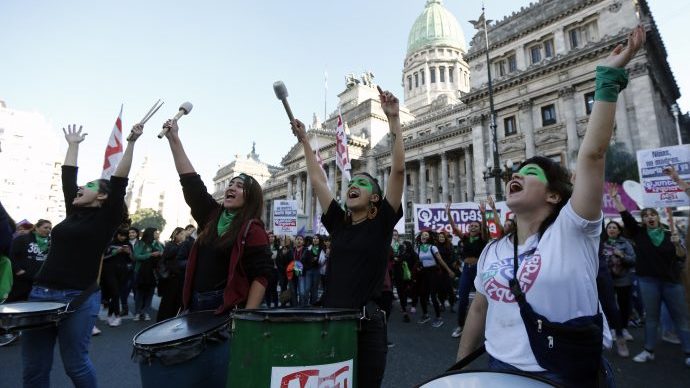After over 3 million Argentines took to the streets last year to successfully oppose efforts in Argentina’s Congress to legalize abortion, the newly elected government decided to widen access to the procedure, bypassing Congress and openly challenging the country’s constitution.
The bishops reacted with one of the strongest statements in years published in the government’s official bulletin Dec. 13, singling out the health minister responsible for the measure.
“The Argentines who are in favor of the dignity and the sacred value of every life are not ‘against-rights’,” says the statement, released by the Argentine bishops’ conference permanent commission.
“We are pained and concerned by this way of behaving that avoids the reasonable democratic debate over the care of life, the first human right,” continues the statement.
The fact that the abortion rules were changed by decree, the bishops argue, goes against the National Constitution, international treaties, the Civil and Penal Codes of Argentina, and several national laws that protect life from the moment of conception.
The current legal codes, which the government is also trying to reform, only considers abortion legal in certain situations: When the physical health of the mother is at risk; when the pregnancy is the product of a rape, and an allegation was raised to civil authorities; and when the mother is considered mentally incompetent.
Among other things, the “abortion protocol” makes it possible for a girl as young as 13 to have an abortion without her parents’ consent. It also eliminates conscientious objection for medical institutions, which must provide the procedure when legally allowed, and could force doctors and nurses to terminate a pregnancy.
In addition, if the baby was the result of a rape, there is no obligation to take the case to civil authorities, a measure pro-life groups denounced as providing protection for the rapist, since he won’t face criminal charges.
The protocol also allows for what Pope Francis has denounced as “eugenic abortion,” the termination of a pregnancy because the unborn baby is diagnosed with a disability.
“In communion with many believers and citizens of good will, we await the revocation of the protocol,” the bishops wrote. They closed their statement, issued at the end of their 183rd assembly, with a prayer to the Virgin of Lujan, patron of Argentina, so that the country welcomes “every life, as it comes.”
In their statement, the Argentine bishops noted the widening of abortion access in Argentina didn’t come through the legislative process. Instead, it was a decree signed by the health minister, Gines Gonzalez Garcia, a man who often sparred with the then-Cardinal Jorge Bergoglio when he was still in Buenos Aires.
The bishop’s “anti-rights” line is a direct response to the health minister, who describes the pro-life movement as people who are against the “right of women to choose over their own bodies.”
Gonzalez Garcia has ties to International Planned Parenthood, which last year invested close to $1 million in the pro-abortion legalization campaign in Argentina.
The legalization of abortion was one of the campaign promises of President Alberto Fernandez and his running mate, Vice President Cristina Fernandez de Kirchner, who herself served as president of the country from 2007 to 2015, having taken over after the death of her husband, Nestor Kirchner.
While in power, the Kirchners actively criticized, the archbishop of Buenos Aires, whom they had labeled as the head of the opposition. After his election as pope, she tried to get closer to him.
Also on Wednesday, the leadership of the Argentine bishops met with Fernandez in a protocol meeting, in which they thanked him for attending a Mass for the nation celebrated in Lujan on Dec. 8, which was also attended by Macri in a sign of national unity. They urged the government to protect the most vulnerable and address the country’s high poverty rate; and reiterated their disappointment over the liberalization of abortion, stating the Church always has and always will defend the life of those most unprotected.

